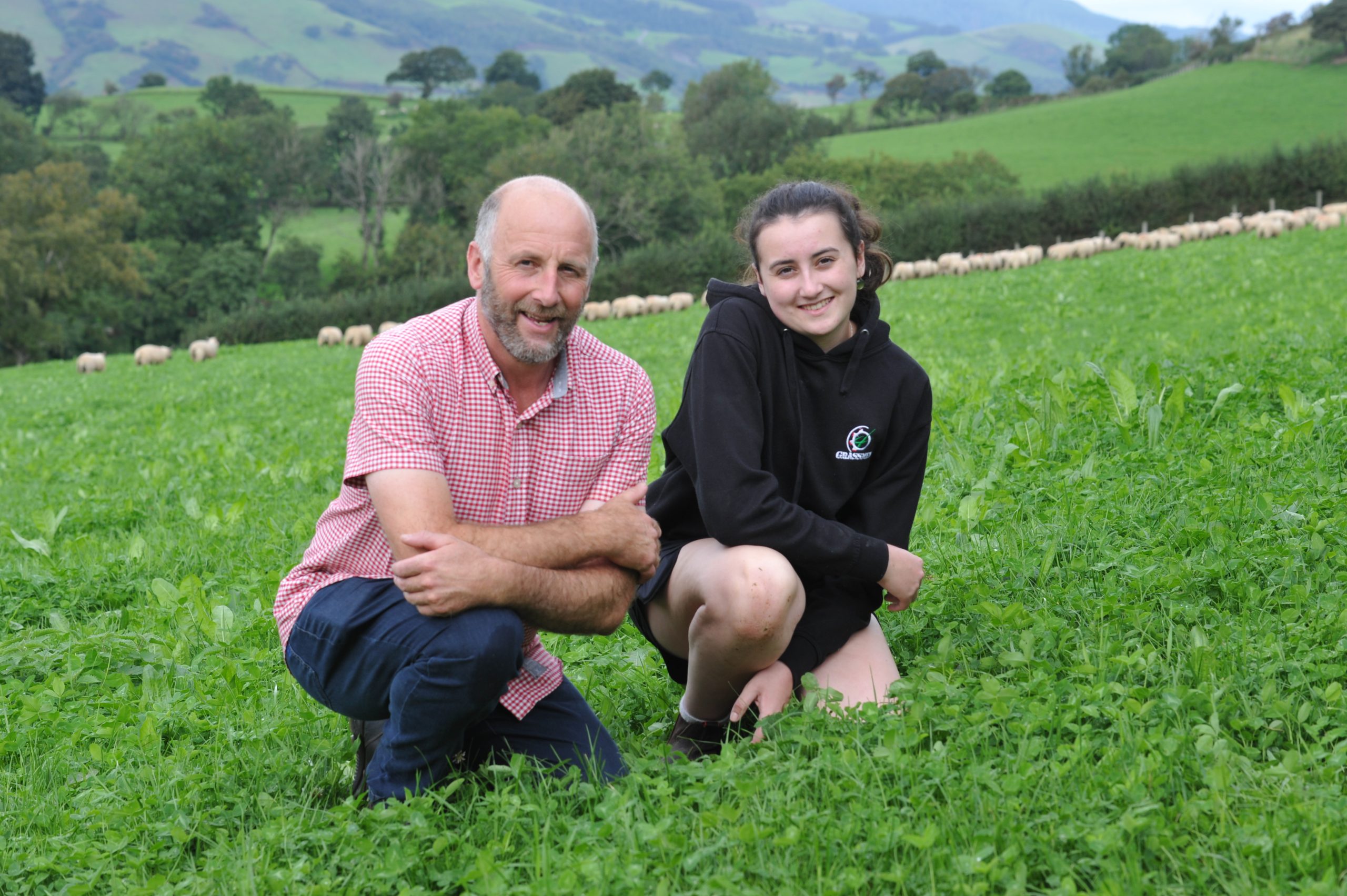Farming
Red clover plays important role in reducing livestock farm’s input costs

PROTEIN-RICH red clover is helping a Welsh livestock farm achieve a total cost of production of less than £3/kg deadweight in its lambs.
Dafydd and Glenys Parry Jones have been farming organically at Maesllwyni since 2001, running a flock of 700 Texel and Aberfield cross ewes and 60 Hereford cross cattle on the upland holding near Machynlleth.
Red clover has been a key component in their system since then, and increasingly so – in the last three years cattle have been fattened solely on it and lambs spend their last two weeks before slaughter grazing these leys.
By continually fixing nitrogen and releasing it when grazed and cut, red clover is not only an important source of feed for the livestock at Maesllwyni but for soil health and nutrition too. At a recent Farming Connect open day at the farm, Mr Jones shared the knowledge he has gained from two decades of growing and feeding the crop.
Twenty hectares (ha) are grown within a rotation on 60ha of silage ground where fields are reseeded every 11 years. By favouring varieties including AberChianti and AberClaret, leys have a five year longevity if looked after, including by not grazing in the winter.
The crop is established in May after ploughing. The farm’s top soil layer is shallow therefore only the top 10cm are cultivated.
Oats, barley, peas and vetches are incorporated in the mix. “The arable mix cleans the field up and creates a canopy to keep the weeds down,’’ said Mr Jones.
The silage is mainly fed to pregnant ewes in the last two weeks before lambing.
Red clover seed is established at a depth of just 5mm and the arable silage at 7.5-10cm.
“We just let the arable seed sit on top of the furrows and find that it works fine,’’ said Mr Jones.
Establishment had previously been in July but by getting the seed into the ground in May it gives red clover an advantage in that first year. “The clover really starts to take off in the middle of the summer,’’ said Mr Jones.
The soil is chain harrowed and rolled after seeding. A bulky first cut is taken in June, the forage wilted for 24 hours, and a second, higher quality cut at the beginning of August, with 48-hour wilting.
“We cut the red clover at a young stage for silaging, to prevent the stem becoming unpalatable for sheep,’’ Mr Jones explains.
The first cut is clamped and the second preserved as big bales. A plastic conditioner is used on the mower to decrease leaf damage.
At over 18% protein, it is a protein-rich crop therefore it is established with companion grasses to provide fibre and energy to help retain that protein in the rumen for longer.
“Producing protein is one thing but you need to have something to absorb it,’’ said Mr Jones.
There are other benefits too from plants and herbs included in the mix, he said.
“Trefoil has tannins which help keep livestock healthy and, as our soils are low in copper, chicory helps to bring that mineral up the soil structure.’’
The target analysis for red clover silage is at least 18% protein, metabolic energy (ME) greater than 11, a digestibility (D) value of over 70 and dry matter at more than 30%.
“Clover doesn’t have a lot of sugar in it so I use an additive to help with the ensiling and to quickly get the pH level down,’’ said Mr Jones.
He doesn’t allow red clover to grow too high before turning sheep onto it. “The stem mustn’t get too thick because the sheep don’t like it when it gets to that stage.’’
For grazing, ewes and lambs get priority in the spring, to get lambs fattened and sold, and after 1 July it is cattle that get the first bite.
“We fatten lambs on red clover but not for too long otherwise they get too big and fat,’’ Mr Jones explained. They are grazed for two weeks and then weighed.
No concentrates are fed, largely thanks to the high-quality red and white clover silages and excellent grazing management.
This has helped decrease total cost of production to under £3/kg deadweight in lambs.
“In many systems it is the Single Farm Payment that is the profit but by keeping our costs down the lamb is the profit and the payment is a bonus,’’ said Mr Jones.
Carbon footprint in his lamb system is 11.4kg C02/kg liveweight. Cattle are finished at 20 months – they can achieve daily liveweight gains of up to 1.6kg when grazing red clover.
Soil is regularly sampled – the red clover and herbal ley fields consistently at 6-6.5pH. Healthy soils are important for beneficial insects too, such as the dung beetle, which is adept at recycling nutrients.
Lynfa Davies, Farming Connect Biodiversity Specialist, advised farmers attending the open day that the dung beetle plays a vital role in livestock systems through dung pat management and parasite control.
“Having good populations of dung beetles is a ‘win win’ as it reduces parasite loads as well as getting nutrients underground to feed that next flush of grass, and they also provide feed for other wildlife and birds,’’ she said.
Good populations of dung beetles also help reduce greenhouse gas emissions from livestock production as they draw faecal matter down into the soil. They are very vulnerable to anthelmintics, in particular ivermectins.
Ms Davies said, treating animals that have a proven parasite burden, by using faecal egg counting to establish worm levels, will promote and preserve dung beetle populations.
Grazing livestock all the year round is beneficial too as different species of dung beetle are prevalent at different times of the year.
“It doesn’t have to be prime cattle, perhaps some youngstock or sheep,’’ said Ms Davies. “If there are farms in the locality that have stock in fields all the year round that will help too.’’
The open day was facilitated by Farming Connect Red Meat Sector Officer Owain Pugh.
He said the Jones family were demonstrating how important crops like red clover were in reducing inputs.
“The image of Welsh farming is very important now and will be even more so in the future and cutting out proteins with high carbon footprints such as soya is paramount,’’ he said.
A number of projects trialling systems for reducing inputs are being carried out on the Farming Connect Our Farms network.
Business
Farmers cautious but resilient as costs remain high across Wales

Major supplier says confidence lower despite signs of stability returning
FARMERS across Wales are facing another difficult year as input costs remain significantly higher than before the pandemic, according to new industry insight from agricultural supplier Wynnstay Group.
The company, which has deep roots in rural Wales and generates around sixty per cent of its retail revenue in the country, says confidence among farmers is lower than this time last year, with rising costs, policy uncertainty and tightening margins influencing spending decisions.
However, there are also signs of resilience, with many producers focusing on efficiency and forward planning to cope with ongoing pressures.

Wales at heart of business
Wynnstay, originally founded by tenant farmers in Mid Wales in 1918, has grown into a major UK agricultural supplier serving more than 20,000 farming customers through manufacturing sites, stores and on-farm services. The group employs hundreds of staff across the UK and operates a nationwide distribution network supporting livestock and arable producers.
The company says Welsh farming businesses continue to play a central role in its commercial performance and long-term growth strategy.
Cautious investment decisions
According to Wynnstay, farmers are delaying some investment decisions but are increasingly seeking value-driven solutions that improve productivity.
Feed volumes have increased across the company’s Welsh store network over the past year, reflecting demand for blended feeds that offer greater flexibility and cost control. Rather than reducing purchases outright, many farmers are matching spending more closely to performance and output.
Fertiliser demand has also been strong, with sales ahead of last year, although some farmers have delayed buying in the hope prices may fall. Global supply pressures and rising gas costs mean prices are expected to remain firm into the busy spring season.

Costs still far above pre-Covid levels
Industry data shows overall farm input costs remain significantly higher than before 2020, with feed, fertiliser, fuel, electricity and machinery all continuing to put pressure on farm margins.
While some costs have eased from their peaks, they have not returned to previous levels, influencing buying behaviour across the sector.
Margins for livestock and dairy farms were strong last year, but Wynnstay says they are now tightening, particularly in the dairy sector where milk prices have fallen and volatility remains high.

Pressure on family farms
Smaller family-run farms are under greater strain than larger commercial operations, with less financial resilience to absorb rapid market changes. Reports of rising closures among family farms, particularly in dairy, reinforce concerns about the sector’s long-term sustainability.
Government policy changes are also contributing to uncertainty. The transition away from the Basic Payment Scheme and wider tax reforms have led many farmers to postpone larger investments until there is clearer long-term stability.

Local reaction
Pembrokeshire farmer Chris James said the situation reflected what many farmers were experiencing locally.
“We’ve definitely noticed the squeeze over the past year or two,” he said. “Costs for feed, fertiliser and fuel are still much higher than they used to be, and that makes you think twice about every decision. Most farmers I know aren’t cutting back on production — they’re just trying to be more efficient and careful with spending.”
He added: “People want to invest and move forward, but it’s hard when you don’t know exactly what the long-term policy picture will look like.”
NFU Cymru has also warned that rising costs and policy uncertainty continue to weigh heavily on farm businesses across Wales, with confidence affected by concerns over future support schemes and wider economic challenges. The union has called for greater long-term certainty to allow farmers to invest with confidence and maintain domestic food production.

Weather shocks impact behaviour
Extreme weather during 2025 — including a very dry spring followed by periods of intense heat and a challenging wet autumn — also affected purchasing patterns, with farmers spacing orders and prioritising essential inputs as conditions changed.
Ordering behaviour is now returning to more normal patterns as conditions stabilise.
Outlook for 2026
Despite ongoing pressures, Wynnstay says it is cautiously optimistic about the year ahead.
Many farmers are making careful decisions around efficiency, nutrition and planning, and the company believes there are opportunities for businesses to strengthen their position through 2026 with good cost control and smart investment.
Summing up the sector, the company said Welsh agriculture remains resilient, with farmers showing determination and adaptability despite continuing challenges.
Farming
Growing fodder beet could be attractive option after difficult 2025 forage season

AFTER the lack of forage in many areas in 2025 due to the drought, this season could see increased interest in growing fodder beet on livestock farms, believes ProCam agronomist, Nick Duggan.
Once fodder beet gets its roots down, it can be quite drought tolerant, says Nick, so it could appeal to farmers looking to diversify forage crops to mitigate risk.
“Although inputs can be quite high, fodder beet does offer a big crop of energy,” explains Nick, who operates in Herefordshire, South Shropshire, Powys and the Cotswolds.
“Compared with stubble turnips yielding about 4-6t of dry matter/ha (DM/ha), fodder beet might yield 20t DM/ha. And, at around 12.5ME, the energy content of its roots is similar to grass.
“There’s also the flexibility to feed fodder beet to sheep, beef or dairy, and to lift or graze it, although it’s important to ‘wean’ livestock onto it gradually, especially cattle, because its high energy content can cause acidosis,” he adds.
To help ensure that farmers grow the right varieties for their situation based on robust data, Nick says ProCam has been evaluating the performance of fodder beet varieties over multiple seasons, with on-farm trials conducted in the North and West of the country as well as other locations country wide.
“We test a range of varieties,” he continues. “These range from low DM beets for grazing, to high energy types for lifting and chopping for livestock, or for use in anaerobic digestion (AD) plants.
“Typically, 20 or so varieties might be tested annually in these replicated trial plots, with 4-5 new varieties included each year. But a lot of the established varieties have been in the trial for maybe six years – so we have long term data and can robustly benchmark new varieties.”
Assessments begin with variety emergence and vigour, and conclude at harvest by measuring yields, says Nick, with beets lifted and tops and roots weighed separately. Yields per hectare are then calculated, corrected for %DM.
“Also at harvest, each variety is assessed for disease resilience, and for the amount of root protruding above the soil. More root protruding is helpful if grazing. If lifting beet, you want more root in the ground for protection from frost.
“Agronomically, we encourage all farmers to keep the tops as healthy as possible with a summer nutrition programme. As well as helping to protect roots from frost, a healthy canopy helps sustain the crop into winter. This helps if growing for energy for AD plants, but also tops have good feed value, at about 17% crude protein, and can provide 2-2.5t DM/ha.”
In addition to evaluating varieties, ProCam also evaluates the performance of primed seed, says Nick, which is available with certain fodder beet varieties. Primed seed is pre-germinated for faster emergence, and tends to produce more uniform plants at the cotyledon stage, he notes.
“Faster establishment, in turn, helps with weed suppression, and once fodder beet reaches 12 leaves, it becomes more tolerant to virus yellows.
“Plus, primed seed can deliver higher yields. Results can vary, but in five years of trials on the variety Geronimo we saw a yield uplift of approximately 1.5t DM/ha from Active Boost primed seed compared with conventional seed.
“With the unpredictable spring weather we get nowadays, I think primed seed is extremely useful technology for fodder beet growers.”
Photo caption: Fodder beet offers a big crop of energy, and once it gets its roots down it can be quite drought tolerant, says ProCam agronomist, Nick Duggan
Farming
Deputy First Minister raises concerns over fishing funds and farm policy

Funding formula and visa rules among key issues discussed ahead of Senedd election period
THE WELSH Government has voiced concerns over fishing funding allocations, farm policy, and potential labour shortages during a recent UK-wide ministerial meeting on rural affairs.
Deputy First Minister and Cabinet Secretary for Climate Change and Rural Affairs, Huw Irranca-Davies, attended the latest Inter-Ministerial Group for Environment, Food and Rural Affairs meeting on Wednesday (Feb 5), alongside ministers from the UK, Scottish and Northern Ireland governments.
One of the main topics was the UK Fishing and Coastal Growth Fund. Ministers from devolved administrations expressed disappointment that the Barnett formula had been used to determine allocations, arguing it failed to reflect the size and importance of the fishing sector in each nation or previous funding levels.
Talks also covered progress on negotiations for a UK-EU sanitary and phytosanitary (SPS) agreement, which could affect cross-border trade in food, plants and animals. Devolved governments welcomed engagement from the UK Government so far but stressed the need for continued cooperation, particularly around biosecurity and the legislative process required to implement any agreement across the UK.
Ministers also discussed the UK Government’s Farm Profitability Review — known as the Batters Review — and the emerging UK Food Strategy. Although these policies apply mainly to England, ministers noted they could still have implications for Wales and other devolved nations, highlighting the need for collaborative working.
A joint approach to banning peat use in horticulture was also agreed in principle, with the Department for Environment, Food and Rural Affairs (Defra) expected to set out possible timelines.
Concerns were also raised about proposed changes to UK work visa rules, which ministers warned could worsen shortages of seasonal agricultural workers, particularly sheep shearers. UK Government ministers acknowledged the risks and said discussions were ongoing.
The next meeting of the Inter-Ministerial Group is scheduled for March 2026, ahead of the upcoming elections in both Wales and Scotland.
-

 Health3 days ago
Health3 days agoWithybush loses emergency surgery in shock health board decision
-

 Health3 days ago
Health3 days agoHealth board confirms major hospital changes across west Wales
-

 Health2 days ago
Health2 days agoConcerns grow over Bronglais stroke plans as politicians demand clarity
-

 Health3 days ago
Health3 days agoHealth board: Changes will bring “resilience and sustainability” to West Wales services
-

 Business5 days ago
Business5 days agoMS’s host business advice surgery following demand from Business Rates Online Forum
-

 Local Government13 hours ago
Local Government13 hours agoCandidate who withdrew from Hakin race will still appear on ballot paper
-

 Community7 days ago
Community7 days agoHywel Dda hospital services decisions will be made next week
-

 Business6 days ago
Business6 days agoSvitzer crews at Milford Haven vote for industrial action in pay dispute



























